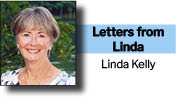
Dear Readers,
What is your earliest memory?
Mine is of a warm afternoon in a small room where sunlight, peeking between the slats of window blinds, casts a golden striped pattern on the nearby white chenille bedspread, mimicking the pattern of the wooden slats on the sides of the baby crib along the wall. (Funny how we humans at even the youngest ages — I might have been 15 months old at the time — seek out and are comforted by patterns, repetitions, continuity.)
Nonie
I’m resting my head on Nonie’s shoulder. I can feel the smooth material of her house dress; I can see the flowered fabric of her apron; I can hear her soft contralto humming In the Good Old Summertime; I can feel the motion as she sways back and forth in an unsuccessful attempt to lull me to sleep.
Nonie’s family had been extremely poor in Turin, Italy. They were a little less poor as farmers in the coal mining country of central Illinois where Nonie dropped out of school in the third grade to help on the farm. Things improved for Nonie in 1920 when she married my grandfather, an immigrant from County Down, Ireland, who had worked in the coal mines until he was able to pass the civil service exam and get a job as a security guard on the St. Louis to Chicago mail train.
Nonie tried to teach us grandkids how to bake her delicious rosemary chicken and apricot pie, but unfortunately, I was distracted during those lessons by the old-fashioned water pump affixed to the kitchen sink, the mousetraps scattered about in the adjacent ramshackle pantry, and the outhouse in the yard (leaning ever so slightly at what I imagined must be the same angle the Tower of Pisa tilted) not far from the half-acre of grapevines from which Nonie made the best homemade wine in all of Will County.
What did Nonie leave me?
Grandma Ruth
A memory from when I was about four comes back to me now — I am sitting on a fancy chair (my feet don’t reach the ground) and wearing my turquoise Easter coat, my pinching patent leather Sunday shoes, and brand-new white gloves which my other grandmother, Grandma Ruth, insists are mandatory for afternoon tea here at the prestigious Keenan hotel — the hotel founded by her father, my great-grandfather Keenan, in Fort Wayne 50 years before. (If you were a U.S. president travelling through the Midwest around the turn of the last century, you would have stayed in a Keenan hotel.)
I remember the pattern of the gold grapevine edging the rim of the delicate dishes. I remember the scarlet paisley pattern on the plush carpet. I remember how Grandma is appalled by my lack of proper teatime table etiquette.
Grandma Ruth was intelligent, well-educated (she studied art in Europe), born long before women’s lib, and who, despite her strong protestations, was not allowed any position in her father’s hotel business. Those jobs, along with all the power and glory (and the money) that came with them, went to her brothers.
When the beloved and highly esteemed Keenan patriarch died in one of his own hotel rooms under rather mysterious circumstances, Grandma fled to Hawaii (quite brave for a 22-year-old woman on her own) to recover from a nervous breakdown. In later years, when her husband’s business was lost during the Great Depression, Grandma clung to the memory of happier, richer days, and the glowing by-gone era of society soirees, fancy evening gowns, impeccable manners, and linen tablecloths at afternoon tea.
What did Grandma Ruth leave me?
What they left me
Nonie taught me the value of hard work; the importance of family and faith (she never missed Mass); and a love for the simple things in life like a scrumptious lasagna dinner, a robust belly laugh, and a loving lullaby at bedtime.
Nonie left me a small, brown composition book in which she recorded the jokes she’d heard on Hee Haw, the only TV show she ever watched. Most of the small, neat handwriting in the book is hers, but I recognize some of it as my own. Occasionally, if I was visiting on a Saturday night, Nonie would ask me to record the jokes for her, claiming my handwriting was much better than hers.
Grandma Ruth taught me that good manners and proper dress never go out of style; she taught me the importance of family and faith (she also never missed Mass) and women’s rights. She taught me to keep “a stiff upper lip” regardless of the hand life might deal, and she taught me to seek out and admire the transcendent beauty found in fine works of art.
Although Grandma Ruth never did learn to cook (we kids dreaded her dinners of instant mashed potatoes and tomato aspic Jello salad), she left me her silver flatware which I occasionally remove from its velvet-lined box to polish; the shine is still there, underneath, despite the passage of time.
I lost both grandmothers when I was a teenager, and I wonder, as the many years go by, if Nonie was actually “richer” than Ruth was, and I wonder too how their legacies have been reflected in my own life. What, dear Readers, did your grandmothers leave you?
Funny how we humans, at even the oldest ages (I’m almost 68 now), seek out and are comforted by patterns, repetitions, continuity.
This year as Mother’s Day draws near, and as I await the birth, any day now, of my first granddaughter, I wonder what I will leave little Mae Linda Swanson.
Linda Kelly is a member of Blessed Sacrament Parish in Madison.

